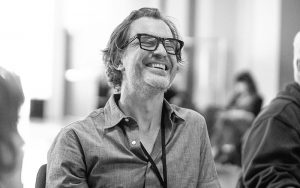“I hope the play sneaks up on people”:
a conversation with playwright Sarah Ruhl
Sarah Ruhl is an award-winning American playwright, author, essayist, and professor. Her plays have been produced extensively over the past 20 years, including here in her hometown of Chicago. Eurydice was one of her earliest successes, premiering at Madison Repertory Theatre in 2003 and helping earn Ruhl a Whiting Award for emerging talents. The play was produced Off-Broadway at Second Stage Theatre in 2007, by which time Ruhl had already been awarded a MacArthur Genius Grant and her new play, The Clean House, had received a Susan Smith Blackburn Prize and been named a finalist for the Pulitzer Prize for Drama. In 2010, Ruhl’s play In the Next Room, or the vibrator play opened on Broadway, earned Ruhl a Tony Award nomination for Best Play, and was also a finalist for the Pulitzer Prize. In the years since, a half dozen more plays of Ruhl’s have been staged Off-Broadway, and in 2016 she was awarded the Steinberg Distinguished Playwright Award, one of the largest prizes given to playwrights.


Writers Theatre Artistic Director Braden Abraham has been a fan of Ruhl’s work since seeing a developmental reading of Eurydice in the early 2000’s, prior to its world premiere. He spoke with the playwright on Zoom prior to rehearsals beginning, and an edited transcript of their conversation is below.
BA: Plays can transport us anywhere, but theatre in the making of it is always rooted in a sense of place. What comes up for you when you think about this play happening in this place, which is just up the road from where you grew up on the North Shore.
SR: It’s very moving to me. I think the play is set in the underworld, but it’s also set in the Midwest, and in the space of my childhood, which is always a kind of memory space. But it’s also a real space that continues alive and well, so I’m really honored that it’s being done at Writers Theatre.
BA: When did you write the play?
SR: I started the play when I was 26 years old and I finished it two years later.
BA: So it didn’t come to you in one go? It was in pieces over time that it came together?
SR: The whole shape of it came to me in one go. I think I wrote the first draft pretty quickly, and it was slightly shorter than it is now. But I had several reading where I refined it. That’s why I say two years to finish it. And it premiered at Madison Repertory Theatre four years or so after I wrote it. I feel like I don’t finish a play until it’s in production and usually I don’t finish the play until it’s in the second production. So even though I might have written a first draft fairly quickly, it elongates to create space for revisions in real time and space.
BA: You dedicated the play to your dad. Why did you dedicate it to him?
SR: My father died when I was 20. He was diagnosed with cancer when I was 18, and I was really close with him. I think I was searching in myth for a way to talk about the grief and to talk to him again through the portal of art. So the play felt like a ritual for that and is very much for him.
BA: Are there parts of the play that are directly inspired by your conversations with him?
SR: The father at the end [recites] directions from Chicago to my grandparents’ house in Iowa. And there’s a monologue he has about going duck hunting that’s just a direct transcript of an oral history I did, talking with my father when he was sick.
BA: Is it true that he would teach you and your sister new words at the pancake house on Green Bay Road?
SR: Walker Brothers, yes! He would teach us a new word a week. Although my sister slept late, and I woke up early, so it was often just me and my father. Now I can’t imagine being the early riser, but I was then.
BA: When you look at the play now, looking back 20 years, do you see new things in the play you didn’t see before? Do you recognize yourself in the play?
SR: I still do. It’s funny because I’m not the same person I was when I wrote it, but I just did an opera version of it at the Met and it was really interesting collaborating in a different form, giving it to a composer to make his version, and distilling the story so that there’s more empty space for other collaborators. I felt that I could see myself in it but also there was so much more room for other people in it, the more I was collaborating with singers, designers and on a different scale, I felt like it really belongs to other people now—I’ve given it away in a certain sense, but I can still locate myself somewhere in there.
BA: And Mary Zimmerman directed that production, correct?
SR: She did. She did it beautifully. I wish that her production could come to Chicago at some point.
BA: Growing up in Wilmette and discovering theatre in Chicago, who were some of your influences and how did being here shape you as a theatre artist?
SR: Well I saw Mary’s work from a young age. I saw her Metamorphoses which I’m sure influenced Eurydice, and her Notebooks of Leonardo DaVinci. Her sense of visual landscape mixed with literary culture was absolutely an influence. Chicago has two modes—one is realism and kinetic visceral acting, pretty naturalistic. And then I think Chicago has this other tradition—Mary’s work, Frank Galati’s work, Joyce Piven’s work. I grew up more in the latter mode, and I was deeply influenced by the sense of ensemble, the sense of people working together, and this idea that you could have beautiful sentences, you could take a piece of literature and you could put it on stage and create a visual landscape for it.
BA: We’re coming out of this time of collective loss, collective mourning, and you talked about how the play is in a way about processing grief. What do you think that theater can offer right now in this time that we’re in?
SR: I think it still offers catharsis. It’s this very Greek thing—you go to the theatre and somehow there is permission in a communal setting to grieve in a way that you can’t grieve by yourself on a Zoom screen. My father-in-law died during the pandemic and there was a funeral on Zoom. I felt completely separated from the event. There are two things that are very hard to do alone: celebrate and mourn. And I think we’ve missed those rituals so deeply. With a ritual, like theater, you have to leave your house at an appointed time. You have to be present. The theatre structures all of that for us, without us having to intellectually practice doing it. We’re so out of practice with all those normal ritualized behaviors. I think it couldn’t be more important to support theatre as an art form. Families used to at least watch TV in the same room. Now you watch in your own room. Everything’s individuated and separate and atomized. Whereas theater brings together people into community. We need that so badly. I have a line in my new play, Becky Nurse of Salem: “No one is ever lonely when they’re in a play,” which is not the most profound sentence, but I find it to be true. I’m never lonely when I’m making theatre and I think we need more cures for loneliness post-Covid and in this country.
BA: What should people know before they come to see the play? What would someone inviting friends say?
SR: I think what people should know is you don’t have to know the myth. If you do, that’s fine. It’s a really human story about love. It might make you cry; it might not. There’s humor. And I hope that the play sneaks up on people. I think that’s my favorite thing is when a play sneaks up on you emotionally, you don’t exactly know how or why, but like a poem, it sneaks up on you.


No comments yet.